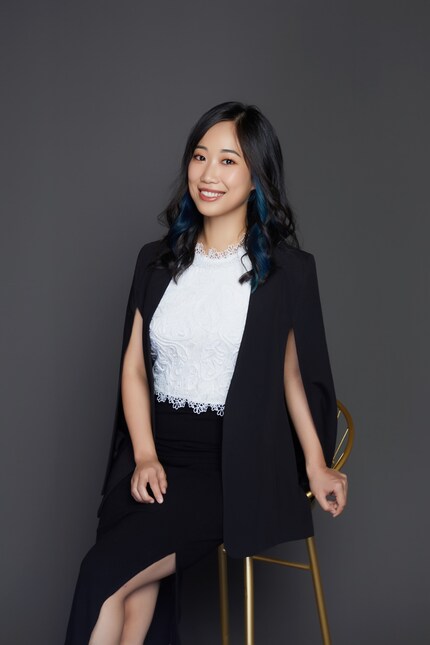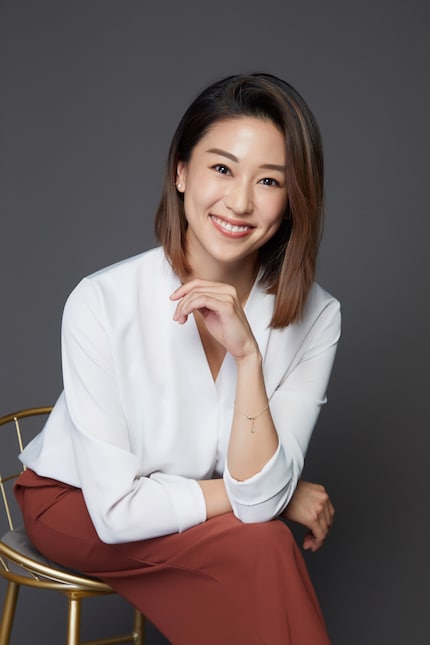
Background information
«Since becoming a mother…»
by Natalie Hemengül

We all have toiletries sitting in our bathrooms – and we all trust that they work. All without knowing that in developing its products, the cosmetics industry focuses more on marketing than the product effect. At least, that’s what US chemists Victoria Fu and Gloria Lu claim.
Victoria Fu can still clearly recall her mother standing in their bathroom, surrounded by creams, expensive facial toners and fancy essences. Then a teenager, she was stunned by the fact the room contained hundreds of dollars in the form of small tubs, bottles and tubes. However, she also understands that for her mother, the pricey products were a kind of guarantee: «If I’m paying this much money for it, it must work.»
It’s a marketing trap that many beauty consumers fall into. Few people know what’s lurking behind their daily skincare routine, let alone what kind of care their skin actually needs. Today, Victoria works as a chemist and can spot marketing tricks like these («expensive = good») instantly. She and her current business partner Gloria Lu worked for the cosmetics giant L’Oréal for a number of years before leaving the mainstream behind and launching indie beauty label «Chemist Confessions».
The fact that Victoria and Gloria know what it’s like to feel overwhelmed in the cosmetic aisle is down to personal as well as professional experience. Victoria herself has struggled with skin issues all her life. To fight her acne, she’s resorted to countless products, each promising the heavens. In a video chat, she recalls her ordeal; her initially jokey manner soon dissolving into a serious tone: «All I wanted to do with my oily skin was dry it out. Now, I know that’s the worst thing you can do.»
Her own skin problems, as well as her experience of how taboo a topic acne can be ignites a passion for the cosmetics and beauty sector. Victoria changes her degree subject from biology to chemistry in order to be able to do more research on skincare. After graduating, she starts working at L’Oréal in product development.
This is where she develops the formulas behind the ampules, creams and essences that have tempted consumers like her mother into a lifelong beauty shopping spree. She’s essentially responsible for examining the product ingredients in the lab and mixing them in a balanced way. It’s there that she meets future business partner Gloria.


Gloria, who’s also a chemist, sits next to Victoria during our Zoom conversation. Her road to healthy skin has been similarly difficult: «I had dry skin when I was a student, and it kept getting drier and drier, more and more unpleasant. I told myself I needed to buy even more expensive products», the entrepreneur tells me, as Victoria nods in agreement. When Gloria finally goes to a drugstore counter for advice, she’s persuaded to buy a 70-dollar product. «I was a student – I had no money. But I still paid the 70 dollars for it,» Gloria recalls. The product with the fancy name promises to instantly give her skin the moisture it needs. Gloria now knows that it was a water-based moisturiser with no crucial oil components. These components, however, are essential: «The cream didn’t have any ingredients that would retain moisture in the skin too. After a week, the skin on my face started peeling because it was so dry.»
For Gloria, personal experiences like these make her position at the cosmetics giant more than just a job. She wants to make a difference. «It wasn’t just me, it was my friends and family who didn’t have a clue anymore when it came to cosmetics», she recalls. «Educating people about this stuff was a big motivation for me.»
But the enthusiasm that both women enter the company with soon gives way to disillusionment. Creating an effective skincare product? Not a priority at the corporate giant. «I’d hide myself away in Victoria’s lab cubby and complain about work», says Gloria as she describes the beginning of their friendship. The immense frustration of working at L’Oréal didn’t appear out of nowhere: «You’re just a little cog in a massive machine. In an industry where marketing is just everything, as a chemist, you have no say in what’s produced,» she says. Victoria nods and adds: «Corporations monitor and forecast trends years in advance. In the lab, we as chemists would get a briefing from the marketing department which dictated the chemical formula.»
This means that in the beauty industry, there’s only one department that calls the shots: marketing. Their concept shapes the production process in the laboratory where expert chemists are based. New products tend to revolve around a key ingredient that’s trending at that moment. «The focus is on ingredients that can be used to tell good stories, not ingredients that work», the chemists say. «Stories like ‹handmade unicorn tears from the mountains of Tibet›. Sure, stories are important. But as chemists, it was about more for us.»
The market is competitive, and the rules are simple: more products mean higher chances against the competition. There’s high pressure to launch new products on the market. The chemists agree that when all’s said and done, the products aren’t well considered – and the chemical formulas they rely on are sometimes even pretty poor. They go on to say that the ingredients are sometimes used in such weak concentrations that they have virtually no effect. Unfortunately, this doesn’t tally up with the promises on the packaging. Customers aren’t being intentionally lied to, but they aren’t being told the whole story either: «The problem is that beauty corporations don’t understand the whole picture. They run towards a goal without knowing what they’re doing.»
According to the chemists, microbiomes are a good example of this. Administered in the field of dietary supplements, microbiomes are supposed to balance your gut flora. The beauty industry is taking advantage of the trend, even if there’s not much to back it up: «They’re trying to transfer the success of microbiomes straight over to facial and skincare, but there’s not enough data to support it», Victoria says. The misinformation dashes the expectations of consumers. The microbiome fad is certainly justified, but applying it to cosmetics would be seriously overshooting the mark.
After five years, the frustration gets to be too much. The colleagues, who’ve at this point been friends for a while, quit their jobs. They consider turning their backs on the beauty industry altogether at first. Gloria and Victoria give themselves a year off. The distance from their day jobs leads both women to go their own way – within the industry. «We learned a lot at L’Oréal. But, of course, we were always asking ourselves what we could do differently or better as well», the founders recall. «And then we just wanted to do our own thing.»
During their career break, the two launch an Instagram account to educate people on the ingredients of skincare products. Realising there’s a demand for their insider knowledge among the community, they start up their indie label «Chemist Confessions». It could certainly be interpreted as a manifesto against the mainstream beauty industry. On their social media channels, they confidently shed light on the beauty industry’s false promises. The intention is to guide consumers through the labyrinth of skincare products with concrete, scientific information, which, in turn, helps them decide what to buy. What follows is a website of the same name, a podcast, and the book «Skincare Decoded».

They eventually experiment with their own product line too. The two women finally have the chance to take matters into their own hands and make real change within the industry: «We’re chemists. It’s our job to develop products. We wanted to make products that are based on scientific data, and do things the right way from the get-go.»
Incidentally, neither of the women earn money with their Instagram or podcast: «As a platform, we’d have to advertise products we might be totally unconvinced by. This way, we keep our content independent.»
Victoria highlights that their friendship has become more important than ever: «There are so many difficult, unexpected moments. I would’ve had a hard time without the right partner. The journey we’ve been on together has bonded us.»
At the end of that journey, both women have one goal in particular: well-informed, well-educated consumers. Only this can disable the marketing machine working away behind countless products in our bathroom cabinets, say the entrepreneurs. It’s a lofty aim – and there’s still a lot to do: «Finding the right skincare can be very confusing and almost intimidating for a lot of people. As long as that’s the case, our work will never be finished», says Victoria.
Header image: Shutterstock
I'm a sucker for flowery turns of phrase and allegorical language. Clever metaphors are my Kryptonite – even if, sometimes, it's better to just get to the point. Everything I write is edited by my cat, which I reckon is more «pet humanisation» than metaphor. When I'm not at my desk, I enjoy going hiking, taking part in fireside jamming sessions, dragging my exhausted body out to do some sport and hitting the occasional party.
Interesting facts about products, behind-the-scenes looks at manufacturers and deep-dives on interesting people.
Show all